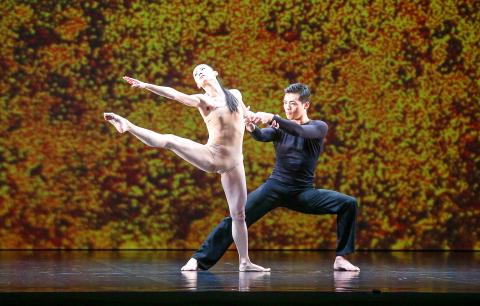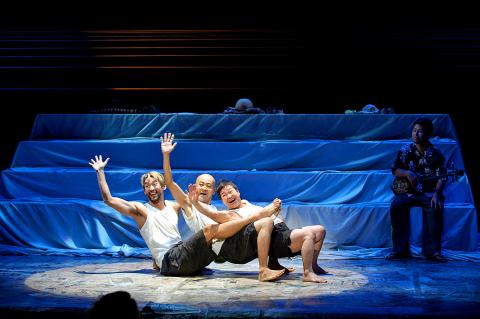The National Theater complex was the place to be last weekend for two beautiful shows, the simplicity of which belied their hidden strengths.
While there was never any doubt that Cloud Gate Dance Theatre’s (雲門舞集) 45th Anniversary Gala Program was going to be a hit with audiences, it was a still a little surprising just how satisfying the show was.
The program was a reminder that while many of artistic director Lin Hwai-min’s (林懷民) works over the past two decades have been stunning visually through the use of video projections and other props, at the heart of his work is delicate sensitivity and quiet beauty that sometimes needs to be seen in isolation to be truly appreciated.

Photo: CNA
Such is the case with the romantic and balletic Autumn Path duet from 2001’s Bamboo Dream (竹夢), wonderfully danced by Huang Mei-ya (黃媺雅) and Huang Li-chieh (黃立捷), which moved several in the audience to tears, and the sensual Pollen duet from 2013’s Rice (稻禾), danced by Tsai Ming-yuan (蔡銘元) and Huang Pei-hua (黃珮華), both of whom will be sorely missed after their retirement from the company, as well as other senior members who are stepping down.
Also delightful was seeing the six-dancer Sunlight segment from Rice, set against the beautiful backdrop of rippling rice stalks in Ethan Wang (王奕盛) video projections, a peaceful idyll that sharply ended by the firecracker visuals of Cai Guoqiang’s (蔡國強) for the Black Angel scene from 2006’s Wind Shadow (風.影).
The power of Lin’s historical tributes to Taiwan was demonstrated by the White Dress segment from 1997’s Portrait of the Families (家族合唱), with stark black and white photographs from the late 1940s and 1950s looming over the dancers.

Photo courtesy of Lim Young-hwan
The entire company was onstage for the finale from 2003’s Pine Smoke (松煙), and the repeated curtain calls were proof that Friday night’s audience did not want the evening to end.
Upstairs in the National Experimental Theater, Children of the Ocean (海的孩子們) was a poignant reminder of the universality of childhood games, the bonds of friendship and the horrors of war.
Korean-Japanese playwright and director Chong Wishing obviously has a way with words, given his track record of plays, films and television shows in Japan, but with Children of the Ocean he shows he is also a master of wordless fantasy.
With three extremely talented mime artist and actors — Fusayo Hashimoto, Hideshiro Suzuki and Lee Jun-young — plus occasional input from samisen player Etsuro Ono, Chong was able to remind the audience of the fun, the fights and the meltdowns of childhood, whether playing with your best friends or siblings.
There were disputes over a paper hat, playing dress-up, a fly interrupting a picnic — which necessitated a giant flyswatter — a great game of ping-pong with the bald-headed Suzuki as the ball. When the trio played soldiers, including fake wounds that led to such gory details as twirling a spilled length of intestines like a jump rope or makeshift brain surgery using scoops of sand to fill in missing brain matter, the action was much easier to deal when there was actually no gore.
It was all lighthearted, with plenty of interaction with the audience, right up until the game of soldiers turned deadly real, Chong’s reference to the Battle of Okinawa and the island’s Suicide Cliffs, which brought to mind my mother’s — and I’m sure moms everywhere — caution: “It’s fun up until someone gets hurt.”
The coda was a lovely scene of the three friends all grown up, a ramen shop owner, a dentist and a fishmonger, who do not recognize each other at first, but are thrilled when they finally do.
Children of the Ocean was a great pick for the National Theater Concert Hall’s ninth International Theatre Festival.

Last week the story of the giant illegal crater dug in Kaohsiung’s Meinong District (美濃) emerged into the public consciousness. The site was used for sand and gravel extraction, and then filled with construction waste. Locals referred to it sardonically as the “Meinong Grand Canyon,” according to media reports, because it was 2 hectares in length and 10 meters deep. The land involved included both state-owned and local farm land. Local media said that the site had generated NT$300 million in profits, against fines of a few million and the loss of some excavators. OFFICIAL CORRUPTION? The site had been seized

Next week, candidates will officially register to run for chair of the Chinese Nationalist Party (KMT). By the end of Friday, we will know who has registered for the Oct. 18 election. The number of declared candidates has been fluctuating daily. Some candidates registering may be disqualified, so the final list may be in flux for weeks. The list of likely candidates ranges from deep blue to deeper blue to deepest blue, bordering on red (pro-Chinese Communist Party, CCP). Unless current Chairman Eric Chu (朱立倫) can be convinced to run for re-election, the party looks likely to shift towards more hardline

Sept. 15 to Sept. 21 A Bhutanese princess caught at Taoyuan Airport with 22 rhino horns — worth about NT$31 million today — might have been just another curious front-page story. But the Sept. 17, 1993 incident came at a sensitive moment. Taiwan, dubbed “Die-wan” by the British conservationist group Environmental Investigation Agency (EIA), was under international fire for being a major hub for rhino horn. Just 10 days earlier, US secretary of the interior Bruce Babbitt had recommended sanctions against Taiwan for its “failure to end its participation in rhinoceros horn trade.” Even though Taiwan had restricted imports since 1985 and enacted

Enter the Dragon 13 will bring Taiwan’s first taste of Dirty Boxing Sunday at Taipei Gymnasium, one highlight of a mixed-rules card blending new formats with traditional MMA. The undercard starts at 10:30am, with the main card beginning at 4pm. Tickets are NT$1,200. Dirty Boxing is a US-born ruleset popularized by fighters Mike Perry and Jon Jones as an alternative to boxing. The format has gained traction overseas, with its inaugural championship streamed free to millions on YouTube, Facebook and Instagram. Taiwan’s version allows punches and elbows with clinch striking, but bans kicks, knees and takedowns. The rules are stricter than the